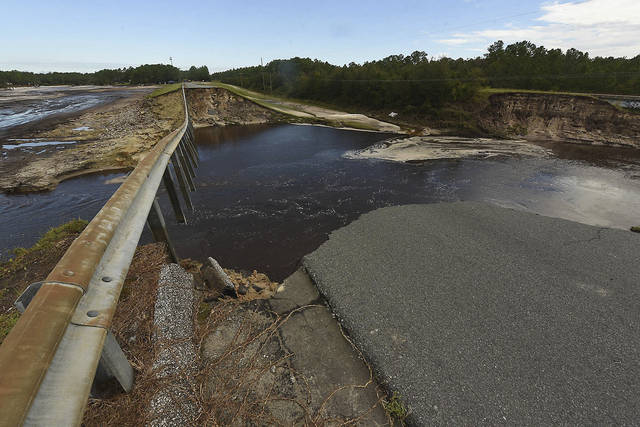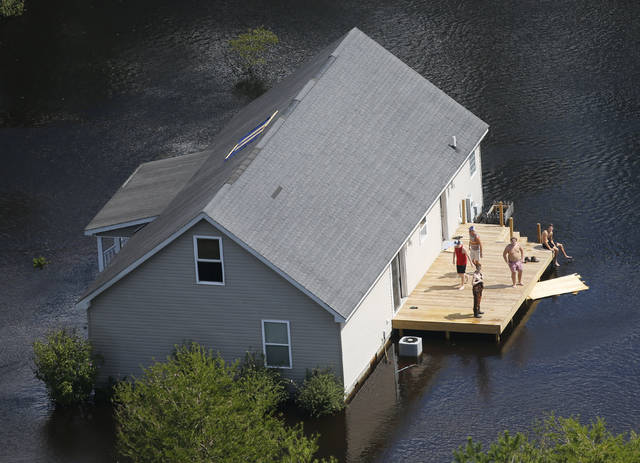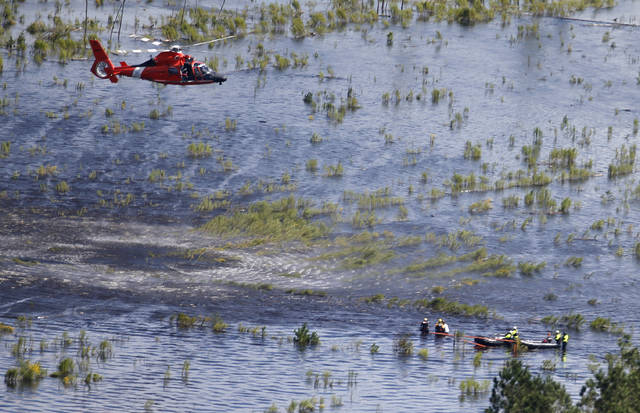The sun is finally shining over parts of the Carolinas, but the clearing skies are only revealing the extent of Florence’s wrath . Though the hurricane packed 90 mph (145 kph) winds as it came ashore, the amount of water Florence pushed ashore and dropped inland has swamped vast areas still vulnerable to rising rivers. Here are snapshots from the counties hit the hardest:
NORTH CAROLINA
BLADEN COUNTY
Florence dropped the most rain over Elizabethtown, about 55 miles (90 kilometers) from the coast. According to the National Weather Service, almost 36 inches (91 centimeters) of rain fell over the city that lies along alongside the Cape Fear River. That breaks a rainfall record for tropical cyclones in North Carolina of just over 2 feet (60 centimeters) set by Hurricane Floyd in 1999, according to the National Hurricane Center in Miami.
CARTERET COUNTY
Nearly 2 feet (60 centimeters) of rain fell over this coastal county. The barrier island community of Emerald Isle started feeling the impacts of Florence more than a day before the hurricane made landfall, and a U.S. government water monitoring gauge ultimately recorded water levels over 6 feet (2 meters) above normal there. Still, despite significant beach erosion and power outages, Town Manager Frank Rush said, Florence could have done much worse. “First of all, I think we’re all just thankful it wasn’t the monster that it was forecast as earlier in the week,” he said.
CRAVEN COUNTY
Forecasters grew increasingly worried about New Bern being flooded by storm surge on the Neuse River the closer Florence got to the coast, and their fears proved to be well-founded: a 10-foot (3-meter) surge was reported in the city, along with more than 16 inches (40 centimeters) of rainfall. Fire Chief Robert Boyd said at least 4,300 homes in the town were inundated by flooding — a staggering one-third of all the homes in a city with a population of 30,000. More than 300 businesses were damaged, and 455 people needed rescuing from the swirling flood waters strong enough to toss unmoored boats into backyards.
CUMBERLAND COUNTY
The stretch of the Cape Fear River winding through this county roughly 85 miles (135 kilometers) from the coast was expected to crest Tuesday at 62 feet (19 meters) — 27 feet (8 meters) over its flood stage. More than 60 people needed rescue from high waters flooding parks and roads in Fayetteville and its suburbs, where a dam overflowed and thousands of people within 1 mile (1.6 kilometers) of the river were warned to find higher ground. Parts of the county saw over 20 inches (50 centimeters) of rain, but Florence was blamed for the deaths of two people before the waters started rising: a husband and wife, both 86 years old, died Friday in Fayetteville in a fire sparked by the candles they lit after their home lost power.
DUPLIN COUNTY
Florence dropped more than 18 inches (45 centimeters) of rain over parts of this county on the northeast bank of the Cape Fear River. Near Chinquapin, a community almost entirely underwater, a monitoring gauge used by the U.S. Geological Survey stopped working Sunday after water levels hit its operational limit of 24.2 feet (7.3 meters) — 8 feet (2 meters) above major flood stage. County spokeswoman Elizabeth Stalls says there have been at least 150 rescues, but there have been many more “to the point where we’ve lost count.” Four people were killed by rising waters in Florence’s wake, the sheriff’s office said.
LENOIR COUNTY
Nearly 19 inches (48 centimeters) of rain fell over the city of Kinston, which was flooded by Neuse River waters rising to over 20 feet (6 meters). Two Kinston men died during Florence: a 68-year-old electrocuted while trying to connect two extension cords in Florence’s torrential rains to power a generator, and a 77-year-old blown to the ground when he went outside to check on his hunting dogs during the storm.
NEW HANOVER COUNTY
Flood waters and downed trees almost entirely cut off Wilmington from the rest of the state, after Florence dropped more than 2 feet (60 centimeters) of rain over the coastal city. Hundreds of stranded residents lined up for food, water and tarps that had to be ferried into the city that’s home to 120,000 people. Residents in New Hanover County and neighboring Pender and Brunswick counties were warned Tuesday not to come home because some routes could flood again and sinkholes were developing under some submerged roads. Two of the first deaths tied to Florence were confirmed in Wilmington, when 41-year-old woman and her 8-month-old baby were killed by a tree falling on their home.
ONSLOW COUNTY
Some of Florence’s heaviest rains also fell in this coastal county, with Swansboro getting soaked with 34 inches (86 centimeters) and Jacksonville exceeding 2 feet (60 centimeters) of rainfall. About 70 people needed rescue from a Jacksonville hotel that started coming apart during Florence’s onslaught. A 56-year-old man was found dead on the back porch of a storm-damaged home, and a 37-year-old man died when his vehicle hydroplaned on a wet road, crashing into another vehicle.
PENDER COUNTY
Just over a foot (30 centimeters) of rain fell over this coastal county, but there has been an extraordinary number of rescues — at least 1,300 since Sunday, half the total reported statewide. County spokeswoman Tammy Proctor said Tuesday that power outages remained widespread, roads were still closed and grocery stores inaccessible. “We’re in the most difficult period right now because the weather has cleared, we see blue skies finally and people are angry and want to get back to normal,” Proctor said. “Normal is not here yet.” A 71-year-old man died when his car ran off a highway into floodwaters, trapping him in the vehicle.
ROBESON COUNTY
By Tuesday, Lumberton seemed to be catching a break, with the Lumber River appearing to fall instead continuing to menace the town about 70 miles (115 kilometers) inland. State officials had been worried the flooding would be worse than the deluge unleashed two years ago by Hurricane Matthew that left people stranded on rooftops of houses. Still, Fire Chief John Paul Ivey said hundreds of calls for water rescue came in, and deliveries of feed to livestock were cut off by flood waters that turned about 30 farms into islands. Nearly 2 feet (60 inches) of rain fell over Lumberton, and an 83-year-old county resident died when part of roadway washed out, causing his vehicle to collide with a cement culvert.
SOUTH CAROLINA
HORRY COUNTY
The heaviest rains from Florence to fall over South Carolina were dumped on this coastal county, where Loris saw nearly 2 feet (60 centimeters) of rainfall. A Loris couple died from carbon monoxide poisoning from a generator running indoors, authorities said. To keep the densely populated tourist destination of Myrtle Beach from going underwater, the state started building a wall of concrete barriers and plastic sheeting on U.S. Highway 501 to protect the route from the Waccamaw River, which already has risen nearly 2 feet (60 centimeters) above a record high set two years ago after Hurricane Matthew. Those efforts likely mean an estimated 1,000 homes in Conway, about 15 miles (25 kilometers) inland from Myrtle Beach, will flood instead.
CHESTERFIELD COUNTY
Florence also dropped more than 20 inches (50 centimeters) of rain in the cities of Cheraw and Jefferson, almost 100 miles (160 kilometers) inland from the state’s coast. Gov. Henry McMaster was doing a flyover of Florence’s flooding in the county when he spotted two men stranded atop a flooded pickup truck; he watched their rescue as waters around them rose at least another foot (30 centimeters). The Great Pee Dee River, which splits the cities of Cheraw and Wallace, finally began slowly falling Tuesday.
———
For the latest on Hurricane Florence, visit https://www.apnews.com/tag/Hurricanes








